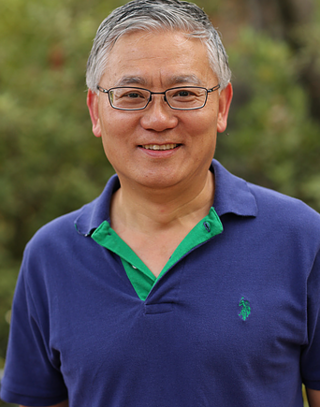Related Research Articles

In human–computer interaction, WIMP stands for "windows, icons, menus, pointer", denoting a style of interaction using these elements of the user interface. Other expansions are sometimes used, such as substituting "mouse" and "mice" for menus, or "pull-down menu" and "pointing" for pointer.

The Information School at the University of Washington is highly ranked an undergraduate and graduate school that offers a BS in Informatics, a Master of Library Science MLIS degree, a Master of Science in Information Management MS, a Museology MA, and a PhD in Information Science.
The ACM Conference on Human Factors in Computing Systems (CHI) series of academic conferences is generally considered the most prestigious in the field of human–computer interaction and is one of the top-ranked conferences in computer science. It is hosted by ACM SIGCHI, the Special Interest Group on computer–human interaction. CHI has been held annually since 1982 and attracts thousands of international attendees. CHI 2020, which was originally planned to take place on April, was cancelled due to COVID-19, and CHI 2021 was held online as a virtual conference chaired by Yoshifumi Kitamura and Aaron Quigley. CHI 2021 “making waves, combining strengths” was originally scheduled to take place in Yokohama.
The Special Interest Group on Computer–Human Interaction (SIGCHI) is one of the Association for Computing Machinery's special interest groups which is focused on human–computer interactions (HCI).
ACM Interactions magazine is a publication covering a number of related worlds, offering content to educate and inspire designers, providing viewpoints related to culture and anthropology, describing innovation and creation in a business environment, and continually investigating the relationship between people, experiences, and technology. Its publisher is the Association for Computing Machinery (ACM), which has its headquarters in New York City.

GroupLens Research is a human–computer interaction research lab in the Department of Computer Science and Engineering at the University of Minnesota, Twin Cities specializing in recommender systems and online communities. GroupLens also works with mobile and ubiquitous technologies, digital libraries, and local geographic information systems.

Human–computer interaction (HCI) is research in the design and the use of computer technology, which focuses on the interfaces between people (users) and computers. HCI researchers observe the ways humans interact with computers and design technologies that allow humans to interact with computers in novel ways. A device that allows interaction between human being and a computer is known as a "Human-computer Interface (HCI)".
Steve Whittaker is a Professor in human-computer interaction at the University of California Santa Cruz. He is best known for his research at the intersection of computer science and social science in particular on computer mediated communication and personal information management. He is a Fellow of the Association for Computing Machinery (ACM), and winner of the CSCW 2018 "Lasting Impact" award. He also received a Lifetime Research Achievement Award from SIGCHI, is a Member of the SIGCHI Academy. He is Editor of the journal Human-Computer Interaction.
Value sensitive design (VSD) is a theoretically grounded approach to the design of technology that accounts for human values in a principled and comprehensive manner. VSD originated within the field of information systems design and human-computer interaction to address design issues within the fields by emphasizing the ethical values of direct and indirect stakeholders. It was developed by Batya Friedman and Peter Kahn at the University of Washington starting in the late 1980s and early 1990s. Later, in 2019, Batya Friedman and David Hendry wrote a book on this topic called "Value Sensitive Design: Shaping Technology with Moral Imagination". Value Sensitive Design takes human values into account in a well-defined matter throughout the whole process. Designs are developed using an investigation consisting of three phases: conceptual, empirical and technological. These investigations are intended to be iterative, allowing the designer to modify the design continuously.
Victoria Bellotti is a Senior CI researcher in the Member Experience Team at Netflix. Previously, she was a user experience manager for growth at Lyft and a research fellow at the Palo Alto Research Center. She is known for her work in the area of personal information management and task management, but from 2010 to 2018 she began researching context-aware peer-to-peer transaction partner matching and motivations for using peer-to-peer marketplaces which led to her joining Lyft. Victoria also serves as an adjunct professor in the Jack Baskin School of Engineering at University of California Santa Cruz, on the editorial board of the Personal and Ubiquitous Computing and as an associate editor for the International Journal of HCI. She is a researcher in the Human–computer interaction community. In 2013 she was awarded membership of the ACM SIGCHI Academy for her contributions to the field and professional community of human computer interaction.

Projector-camera systems (pro-cam), also called camera-projector systems, augment a local surface with a projected captured image of a remote surface, creating a shared workspace for remote collaboration and communication. Projector-camera systems may also be used for artistic and entertainment purposes. A pro-cam system consists of a vertical screen for implementing interpersonal space where front-facing videos are displayed, and a horizontal projected screen on the tabletop for implementing shared workspace where downward facing videos are overlapped. An automatically pre-warped image is sent to the projector to ensure that the horizontal screen appears undistorted.
Abigail Jane Sellen is a Canadian cognitive scientist, industrial engineer, and computer scientist who works for Microsoft Research in Cambridge. She is also an honorary professor at the University of Nottingham and University College London.
Feminist HCI is a subfield of human-computer interaction (HCI) that applies feminist theory, critical theory and philosophy to social topics in HCI, including scientific objectivity, ethical values, data collection, data interpretation, reflexivity, and unintended consequences of HCI software. The term was originally used in 2010 by Shaowen Bardzell, and although the concept and original publication are widely cited, as of 2020 Bardzell's proposed frameworks have been rarely used since.

Jacob O. Wobbrock is a Professor in the University of Washington Information School and, by courtesy, in the Paul G. Allen School of Computer Science & Engineering at the University of Washington. He is Director of the ACE Lab, Associate Director and founding Co-Director Emeritus of the CREATE research center, and a founding member of the DUB Group and the MHCI+D degree program.

Wendy Elizabeth Mackay is a Canadian researcher specializing in human-computer interaction. She has served in all of the roles on the SIGCHI committee, including Chair. She is a member of the CHI Academy and a recipient of a European Research Council Advanced grant. She has been a visiting professor in Stanford University between 2010 and 2012, and received the ACM SIGCHI Lifetime Service Award in 2014.
Andrew Cockburn is currently working as a Professor in the Department of Computer Science and Software Engineering at the University of Canterbury in Christchurch, New Zealand. He is in charge of the Human Computer Interactions Lab where he conducts research focused on designing and testing user interfaces that integrate with inherent human factors.
Karen Holtzblatt is an American computer scientist known for her contributions in human–computer interaction, and particularly in contextual design. She founded InContext Design in 1992, and is its CEO. Holtzblatt was elected to the CHI Academy in 2007 and won the inaugural ACM SIGCHI Lifetime Award for Practice in 2010. Holzblatt is also affiliated with the University of Maryland, as a research scientist in the Human-Computer Interaction Lab and iSchool.

Shumin Zhai is a Chinese-born American Canadian Human–computer interaction (HCI) research scientist and inventor. He is known for his research specifically on input devices and interaction methods, swipe-gesture-based touchscreen keyboards, eye-tracking interfaces, and models of human performance in human-computer interaction. His studies have contributed to both foundational models and understandings of HCI and practical user interface designs and flagship products. He previously worked at IBM where he invented the ShapeWriter text entry method for smartphones, which is a predecessor to the modern Swype keyboard. Dr. Zhai's publications have won the ACM UIST Lasting Impact Award and the IEEE Computer Society Best Paper Award, among others, and he is most known for his research specifically on input devices and interaction methods, swipe-gesture-based touchscreen keyboards, eye-tracking interfaces, and models of human performance in human-computer interaction. Dr. Zhai is currently a Principal Scientist at Google where he leads and directs research, design, and development of human-device input methods and haptics systems.
Meredith Ringel Morris is an American computer scientist who works in human-computer interaction and collaborative web search. She is a principal scientist at Google Brain and an affiliate professor at the University of Washington in The Paul G. Allen School of Computer Science & Engineering and in The Information School.
Jofish Kaye is an American and British scientist specializing in human-computer interaction and artificial intelligence. He runs interaction design and user research at anthem.ai, and is an editor of Personal & Ubiquitous Computing.
References
- 1 2 3 "iSchool Directory | Information School | University of Washington". ischool.uw.edu. Retrieved 2020-10-04.
- ↑ "The Lab". VSD Lab. Retrieved 2020-10-04.
- ↑ "ACM Names 71 Fellows for Computing Advances that are Driving Innovation". Association for Computing Machinery. January 19, 2022. Retrieved 2022-01-19.
- ↑ Besteman, Marit (2020-02-27). "Prof. Dr. Batya Friedman First "Gilles Hondius Fellow"". Delft Design for Values Institute. Retrieved 2020-10-04.
- ↑ Jos, Wassink (9 January 2020). "In celebration of its birthday, TU Delft honours designers with long term visions". Delta. Archived from the original on 2020-08-04.
- ↑ "2019 SIGCHI Awards". ACM SIGCHI. Retrieved 2020-10-04.
- ↑ "Friedman, Wobbrock among 3 UW faculty to earn top honor in HCI". ischool.uw.edu. Retrieved 2020-10-04.
- ↑ "2012 SIGCHI Awards". ACM SIGCHI. Retrieved 2020-10-04.
- ↑ "Dr. Friedman, colleagues win Multidisciplinary Privacy award". ischool.uw.edu. Retrieved 2020-10-04.
- ↑ "The 2011 CPDP Multidisciplinary Privacy Award – Security and Privacy Research Lab". February 2011. Retrieved 2020-10-04.
- ↑ Friedman, Batya; Hendry, David (2012-05-05). "The envisioning cards". Proceedings of the SIGCHI Conference on Human Factors in Computing Systems. CHI '12. Austin, Texas, USA: Association for Computing Machinery. pp. 1145–1148. doi:10.1145/2207676.2208562. ISBN 978-1-4503-1015-4. S2CID 24059203.
- ↑ Jacko, Julie A. (2012). Human-Computer Interaction Handbook : Fundamentals, Evolving Technologies, and Emerging Applications (Third ed.). Boca Raton: CRC Press. ISBN 978-1-4398-2944-8. OCLC 793193195.
- ↑ Friedman, Batya; Kahn, Peter H. (2000-04-01). "New directions". Proceedings of DARE 2000 on Designing augmented reality environments. DARE '00. Elsinore, Denmark: Association for Computing Machinery. pp. 163–164. doi:10.1145/354666.354694. ISBN 978-1-4503-7326-5. S2CID 10729495.
- ↑ Friedman, Batya (1996-12-01). "Value-sensitive design". Interactions. 3 (6): 16–23. doi:10.1145/242485.242493. ISSN 1072-5520. S2CID 9249313.
- ↑ Friedman, Batya; Kahn, Peter H. (1992-01-01). "Human agency and responsible computing: Implications for computer system design". Journal of Systems and Software. Computer Ethics. 17 (1): 7–14. doi:10.1016/0164-1212(92)90075-U. ISSN 0164-1212.